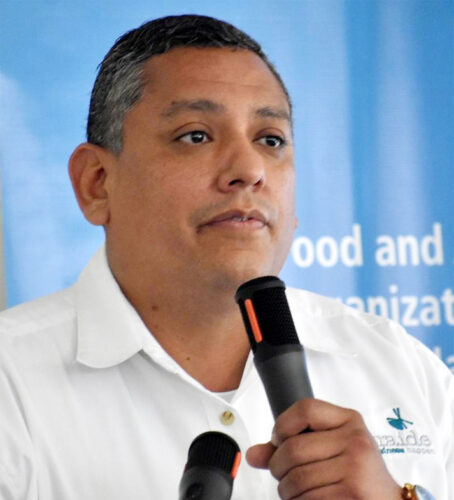FAO rep. Anna Touza PhD gives ICT equipment to Hon. Jose Mai
by William Ysaguirre (Freelance Writer)
BELIZE CITY, Thurs. July 10, 2025
Cooperatives formed by farmers, fishermen, taxi drivers and other producers joined the Ministry of Agriculture, Food Security and Enterprise in celebrating the 103rd International Cooperatives Day which was also the 31st United Nations’ International Day of Cooperatives, observed on July 5, with an all-day forum hosted by the Department of Cooperatives at the Grand Resort Belize near the Haulover Bridge on Friday, July 4.
“Cooperatives: Driving Inclusive and Sustainable Solutions for a Better World” is the theme of this year’s celebration. The aim is to showcase the cooperatives’ potential to help build an inclusive economy, advance the 17 Sustainable Development Goals (SDGs) by 2030, which the UN set as targets in December 2016, and help our society respond to current social, economic and environmental challenges.
The United Nations has also designated this as the International Year of Cooperatives to raise awareness about cooperatives’ impact and their global potential to drive development. The UN is encouraging governments, the private sector and civil societies to support cooperative initiatives, and to promote policies and practices that enable cooperatives to thrive. This year’s celebration will also showcase success stories and innovation in different models of cooperatives, which strengthen the ecosystem that encourages entrepreneurs, fosters leadership with a purpose, and engages young people who are moved to join the cooperative movement.
The UN’s Food and Agriculture Organization (FAO) was also celebrating its 80th anniversary, and has done much to support the development of cooperatives in Belize and to include women and youth in their activities, as FAO representative for the Bahamas, Belize and Jamaica, Anna Touza, PhD, highlighted in her presentation. FAO initiatives have focused on food security, rural development and gender equity, and have sought to build capacity for the digital transformation of agriculture, and for farmers to use the Internet to learn best practices and access up-to-date weather information to guide planting for maximum yield. The FAO has also supported farmers’ cooperatives to help them market their products to increase their income. To accomplish this, the FAO in Belize launched an e-learning platform to help women and young people acquire digital literacy to manage their enterprises. The FAO has also supported farmers with information and communications technology, including computers and heavy-duty drones for crop-spraying.
Other technical support had included training farmers to manage diseases in their crops and livestock. Twenty percent of the farmers were women, as the inclusion of women and youth is emphasized from the outset when a project is designed and in how it is monitored and reported. The FAO promotes gender equity as a key part of any national strategy for rural development.
Dr. Touza gave proof of this support and ongoing partnership by presenting ICT equipment, drones, CAPI devices, and tablets to Minister of Agriculture, Hon. Jose Abelardo Mai.
Early cooperatives in the Caribbean had also helped the emancipated slaves become a driving force in the island economies, and to receive an equitable share of the profits from their labor, noted Sheldon Salino of the Cipriani College of Labour and Co-op Studies as he outlined the history of cooperatives in the Caribbean. Cooperatives and credit unions also supported the islands’ economic and political development towards independence. Today, Caribbean credit unions have 2,440,663 affiliated members with $6.06 billion in savings and $7.2 billion in assets. Another 286,673 non-affiliated members have $1.58 billion in savings and $1.85 billion in assets.

Ishmael Quiroz – executive director BELTRAIDE
Cooperatives can also get funding and technical support in managing their business enterprises from the Small Business Development Center, as BELTRAIDE director Ishmael Quiroz explained when he described BELTRAIDE’s support for Medium Small and Micro Enterprises (MSMEs). This includes the $800,000 Belize Enterprise Empowerment Project, which is empowering 95 MSMEs with financing through grants of $5,000 up to $20,000, and with training to build their capacity to manage their cash flow and market their products, in order to create new jobs. Through EXPORT Belize, BELTRAIDE also helps enterprises to grow and expand production to access export markets for all sorts of products, be it seaweed, health foods, coconuts, cacao and chocolate products, sauces and spices, or services.
New businesses can also get duty-free exemption through fiscal incentives for up to $1 million, said investment policy officer Frantz Smith of the Investment Policy and Compliance Unit, who detailed the many types of businesses which can qualify for this incentive.
Small businesses, farmers, ranchers, fishermen, women entrepreneurs and students can all access financing to improve their businesses from the Development Finance Corporation, as DFC Belize City branch manager Wilfred Usher outlined. These include low-interest student loans, and financing to support renewable energy projects, or to make business operations more energy efficient, as the DFC is now accredited by the Green Climate Fund.
Non-refundable grants of $20,000 to $50,000 are also available to farmers and MSMEs through the Sustainable And Inclusive Belize Project, noted SAIB project manager Debbie Alfaro and tourism project coordinator Denmar Villar. The SAIB can be reached at +501-674-7288 (67-GRANT).

